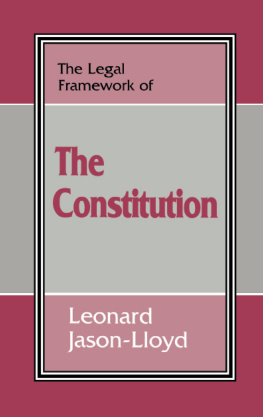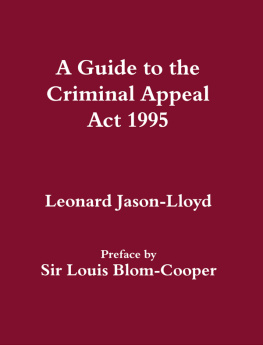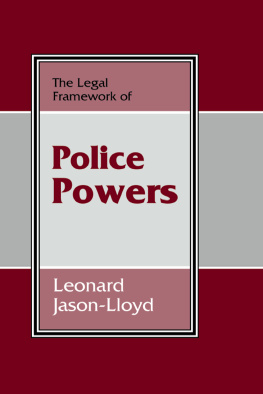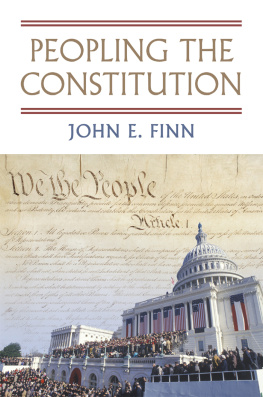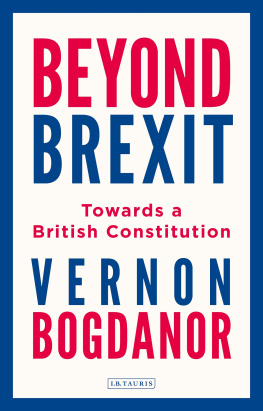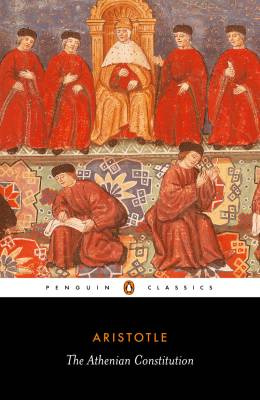The Legal Framework of The Constitution
Titles in the Legal Framework Series
The Legal Framework of the Constitution
Leonard Jason-Lloyd
The Framework of Criminal Law
Leonard Jason-Lloyd
The Framework of the English Legal System
Leonard Jason-Lloyd
The Legal Framework of the European Union
Leonard Jason-Lloyd and Sukhwinder Bajwa
The Legal Framework of the Modern Company
Leonard Jason-Lloyd and Larry Mead
The Legal Framework of Police Powers
Leonard Jason-Lloyd
First Published in 1997 in Great Britain and in the United States of America by
FRANK CASS & CO. LTD.
Published 2013 by Routledge
2 Park Square, Milton Park, Abingdon, Oxon OX14 4RN
711 Third Avenue, New York, NY 10017 USA
Routledge is an imprint of the Taylor & Francis Group, an informa business
Copyright Taylor & Francis 1996
British Library Cataloguing in Publication Data
Jason-Lloyd, Leonard
The legal framework of the constitution
1. Administrative law- England 2. England Constitutional law
I. Title II. The constitution
344.2'02
ISBN 9780 71464 7791 (cloth)
ISBN 978 0 7146 4290 1 (paper)
ISBN 978 1 3150 3659 5 (eISBN)
ISSN 0965-3473
Library of Congress Cataloging-in-Publication Data
Jason-Lloyd, Leonard, 1945
The legal framework of the constitution / Leonard Jason-Lloyd.
p. cm. (The legal framework series)
Includes index.
ISBN 9780-7-1464-7791 (cloth)
ISBN 978 0-7146-4290-1 (paper)
ISBN 978 1 3150 3659 5 (eISBN)
1. Great BritainConstitutional law. 2. Great Britain Politics and government1979- I. Title. II. Series
KD3988.J37 1996
342.41'02--dc20
[344.1022]
96-26293
CIP
All rights reserved. No part of this publication may be reproduced in any form or by any means, electronic, mechanical. photocopying, recording or otherwise, without the prior written permission of the publisher.
1
The Nature of the Constitution
What is a Constitution?
A constitution in the general sense is a set of rules governing the organisation and functions of an association of people. The constitution of a state can therefore be described broadly as the rules by which that nation is governed, although a more precise definition would be the rules governing the organisation and functions of the official organs of state and the interaction between these official organs and the citizenry.
The Sources of the British Constitution
In many respects our constitution is unique both in its workings and development. It is a very fragmented set of rules since it has an unwritten aspect and a written aspect which consists of a conglomeration of primary and secondary legislation (passed within the UK and the European Union), common law judgments (and judgments of the European Court of Justice), and the writings of prominent academic lawyers. These components are as follows.
UK Legislation
Legislation as a whole will be discussed in the next chapter but a brief description is necessary here for the sake of clarification. In this country there are two forms of legislation, namely primary and secondary (another term for the latter is 'delegated legislation'). Primary legislation exists in the form of Acts of Parliament (otherwise known as 'statutes') and many of these passed over the centuries, as well as in modern times, form an important part of our constitution. Examples include the Magna Carta (1215) which, among other things, provided that all citizens should have the right to trial by jury and that certain taxes could only be imposed with Parliament's consent. The Bill of Rights 1689, passed in the wake of the revolution of 1688, effectively asserted parliamentary control over the King and stated that levying money for the Crown would be illegal without the consent of Parliament. The Act of Settlement 1700 laid down the law governing the accession to the Throne, and the Parliament Acts of 1911 and 1949, among other things, reshaped the powers of the House of Lords. Other statutes which have significant constitutional importance include the Life Peerages Act 1958, the Local Government Acts of 1972 and 1985, the Public Order Acts of 1936 and 1986, the European Communities Act 1972, the Police and Criminal Evidence Act 1984 and the Criminal Justice and Public Order Act 1994.
Secondary or delegated legislation includes a host of measures usually enacted under the auspices of Acts of Parliament ('parent Acts') or the exercise of the Royal Prerogative. Examples include the immigration rules made under the Immigration Act 1971, certain by-laws made under the Local Government Act 1972 and regulations passed through Orders in Council under the Emergency Powers Act 1920 (as amended).
Legislation of the European Union
Discussion of European Union legislation and its effects upon our constitution falls largely under. However, some mention is necessary at this point. The primary source of all EU law stems from its treaties, the most well known being the Treaty of Rome 1957 and its subsequent amendments which empower the institutions of the EU to make secondary legislation Regulations, Directives and Decisions. All forms of EU legislation, both primary and secondary, have varying effects upon the UK. It is important to note that in passing the European Communities Act 1972 Parliament made our domestic law subordinate to EU law where the two are in conflict. This has important implications when considering the role of the European Court of Justice (see below).
Judgments of the European Court of Justice
The European Court of Justice should not be confused with the European Court of Human Rights which exercises jurisdiction under the European Convention of Human Rights. The European Court of Justice is the court of the European Union and ensures that the rule of law under the treaties is observed. This court is discussed further in .
Common Law Judgments
There has been an accumulation of cases in this country throughout the centuries which have played a significant part in the workings of our constitution. Examples include the following:
Entick v. Carrington (1765). This case reiterated the old maxim that an Englishman's home is his castle by determining the illegality of using general warrants when searching a person's home. This action arose as a result of Carrington, a King's messenger, entering the home of Entick and seizing documents since it was believed that Entick was publishing seditious material. The execution of this general warrant issued by the Secretary of State was judged unlawful since no specific legal authority for its issue could be found in the law books.
In Moss v. McLachlan (1985) it was held that the police could lawfully stop motor vehicles and turn them back in order to prevent a breach of the peace. This case was centred around an industrial dispute where striking miners, travelling in motor vehicles to reinforce pickets at another colliery, were stopped by the police and turned back.
Other judicial decisions have also played a part in forming the written aspect of our constitution, such as the decision in Fox v, Stirk (1970) where it was held that students were allowed to exercise their right to vote either in their home or university constituencies.

